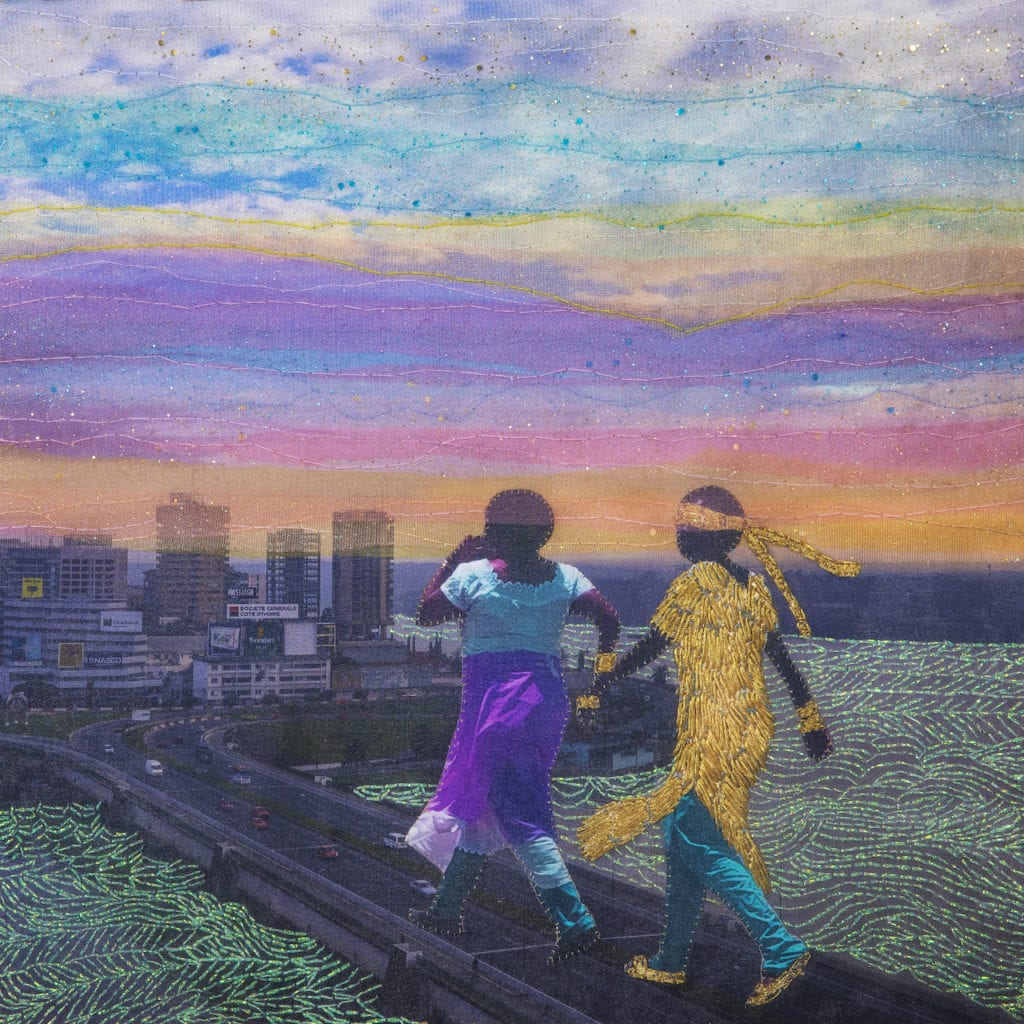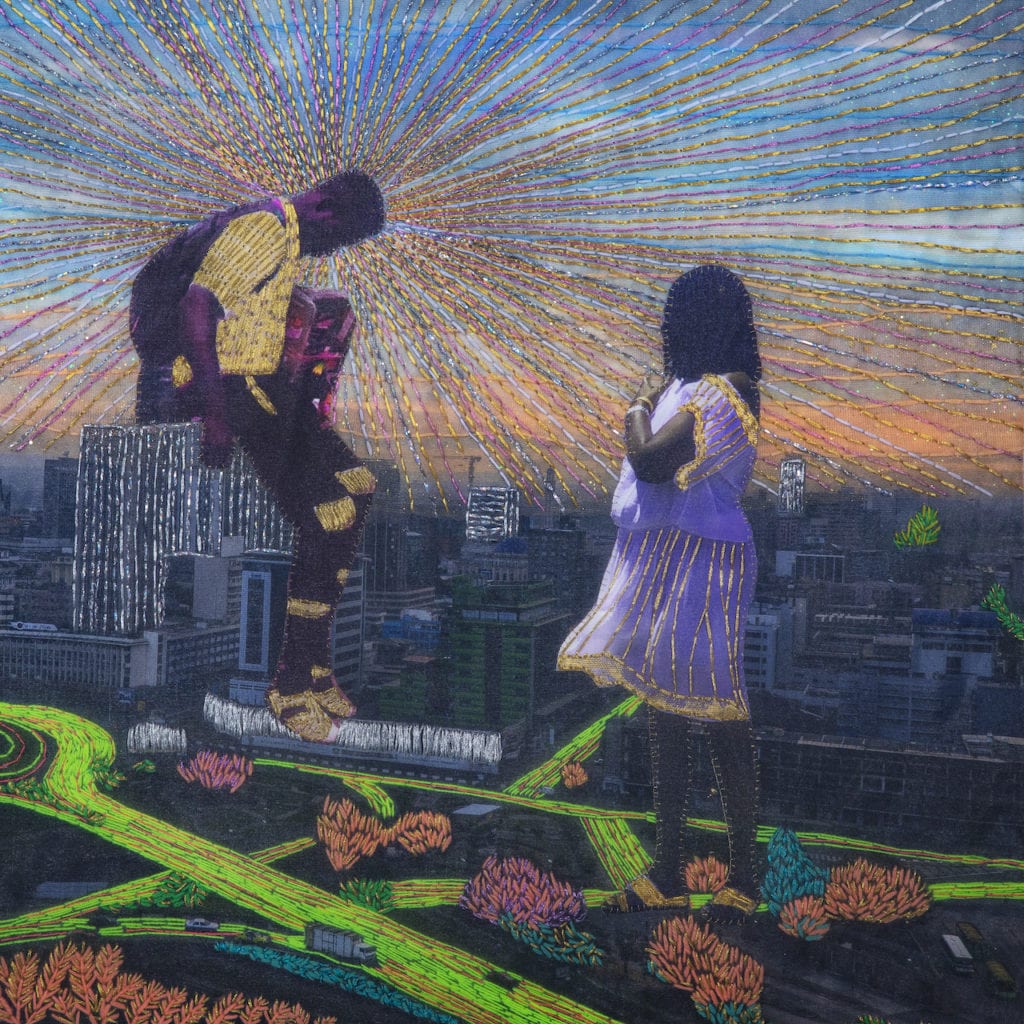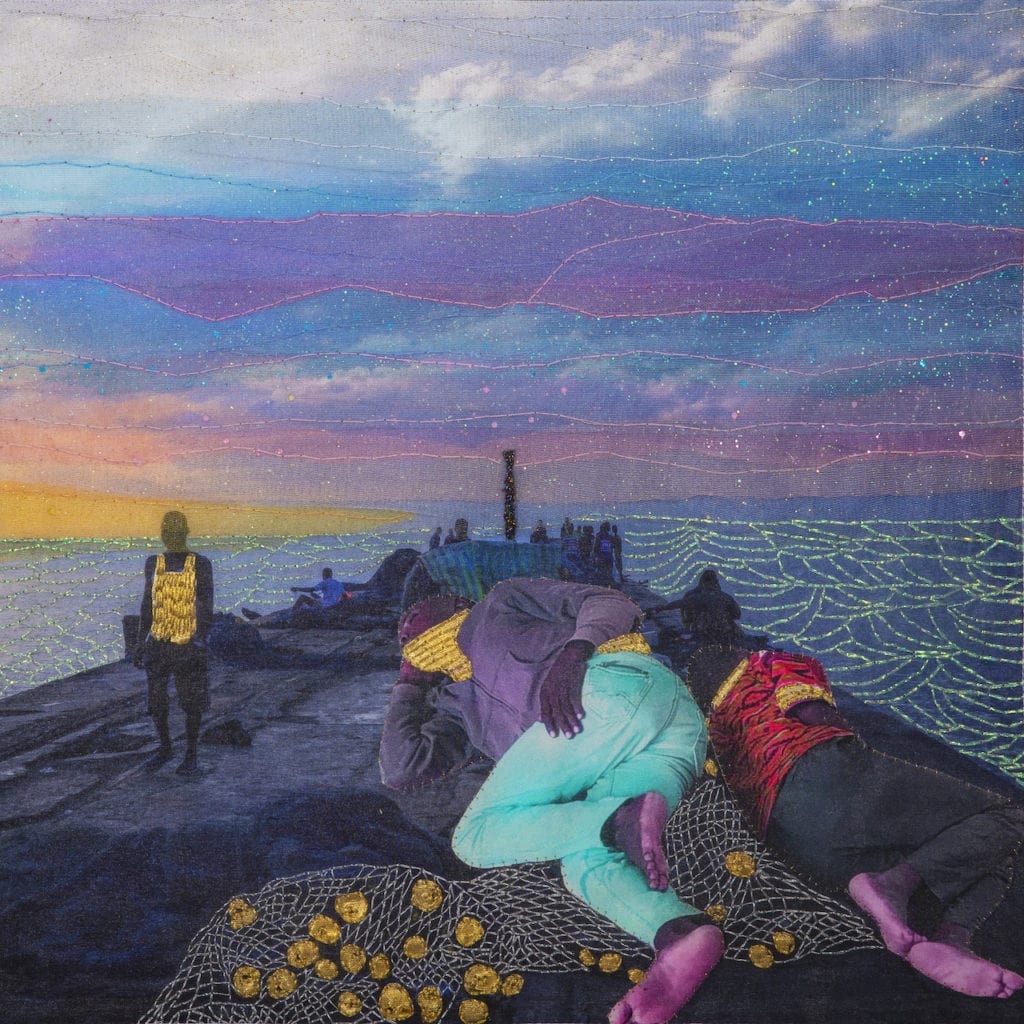This article was first published in the May 2020 issue of British Journal of Photography, The Modern Nude.
In the past few years,Joana Choumali has begun to wake in the dark hours before sunrise. While her children, husband, and indeed most of her city, remain asleep, Choumali has walked around Abidjan, the largest city and de facto capital of Côte d’Ivoire in West Africa, for hours on end. “It was the only time of the day I would have to myself,” Choumali says. “It was a meeting with the first light of the day, and it gave me the strength to carry on with the rest of the day.”
The walks began as Choumali, 46, faced, “a very personal and a very difficult challenge for my family,” she says. To cope, she started to walk strictly between the hours of 5am and 7am. Using her iPhone, she took simple photographs of Abidjan’s streets as they stirred into action. In the early morning light, before the sun revealed itself in the east, the solitary wandering woman captured the city’s mesh of anthropological signature – its landscapes, the early- rising passers-by and partial silhouettes of figures in the distance. “I wanted to record these ethereal, almost magical moments,” she says. “I realised the morning is a blank page on which anything can be printed. The walks became a daily pilgrimage in my own home. I wanted to create an everyday embroidered diary of things that cannot be said.”
Back home, with her children fed and packed off to school, Choumali printed her photographs of Abidjan’s daily awakening straight onto canvas. With an extraordinary attention to detail, she then worked on the images by hand, stitching directly onto the surface of the photograph. By doing so, she imbued each image with a literal, tangible multivalency. Using a blend of collage and photomontage practices alongside techniques associated with ornate embroidery and quilting, and employing textured fabrics, gauze and muslins commonly found in Abidjan’s haberdasheries and clothing markets, Choumali physically superimposed her images with layer upon layer of narrative; gestures, motifs or references taken from private moments, thoughts, dreams or flights of fantasy from her own life.
“An image can translate a state of mind more than words. It’s a way for me to talk to the viewer without having to explain exactly what I was going through”
“Sometimes I would respect the still image, other times I would not,” she says. “It was a freeing process for me, to be able to manipulate a photographic work bit by bit, by spending so much time on it. Each picture became a mood. An image can translate a state of mind more than words. It’s a way for me to talk to the viewer without having to explain exactly what I was going through.”
The creative process takes many long hours of quiet, focused solitude – a mindset Choumali compares to a “ritual and meditation”. Street-based documentary photography is a patient, disciplined practice of observation. Embroidery too requires the artist to focus on and draw out the small details that can elevate a composition from a one-off happenstance to beauty. Combining the two crafts in such a way acted as a form of self-therapy, Choumali says. “They help me to get through everyday life and resolve questions that I have had since I was a child, and I now know can be resolved.”

The final images, Choumali says, are “conceptual portraits” that have the capacity to work as a form of urban anthropomorphism. “I like to compare cities to human characters,” she says. “Abidjan during the day, like a lot of African cities, is very noisy, very crowded. It is not peaceful. But to see it in the morning is like observing a child sleeping. This is always more beautiful. It is then you’re able to see the real features of a person, when they are at their most unguarded.”
Choumali’s work has branched out from Abidjan, and incorporates images taken from Johannesburg, Casablanca (where Choumali studied and worked in advertising and graphic design earlier in her career), Accra and Dakar.
Choumali’s work was recently exhibited in Accra after she came to the attention of Gallery 1957, a privately owned commercial contemporary gallery, founded by the Lebanese entrepreneur, Marwan Zakhem. Gallery 1957 started to establish Choumali at international photography fairs, and the value of her work quickly soared as collectors and institutions jostled to secure original editions. Each time she travelled to a new city, she would continue with her ritual – waking early, walking, recording the city’s awakening and then returning home to embroider her images.
The series is titled Alba’hian, a term from the native Agni language. It translates as “the first light of the day”. It is “an even deeper and bolder way of expressing my personal journey as an artist and as a woman,” she says, comparing it to her previous work. It is a “continuing of this exploration of the landscape of Africa with my inner landscape.”
Choumali’s oeuvre is actively African, exploring what she, as an African woman from a traditional lineage, continues to learn about the myriad tribal cultures that interrelate across Ivorian society in a period of untold and frantic development and change. “My work is a testament to my city, and to the African continent, which I am very much in love with. And it’s a testament to the many cultures and subcultures I observe every day,” she says. “I want to try and understand what it is that brings humans closer, and what divides them. Because, no matter where we come from, I believe we all go through very similar things.”
This might sound like an abstract pursuit. In fact, Choumali’s city has had plenty of experience of the ills of division in recent years. Choumali began to take photographs in the streets in April 2016, just a few weeks after what’s now known as the Grand-Bassam terrorist attack, which saw three terrorists open fire at a beach resort less than an hour away from her home. The event came after a period of tentative peace in Côte d’Ivoire, and “reopened the wounds,” Choumali says, of the country’s civil war. In 2011, fierce fighting erupted after President Laurent Gbagbo refused to step down after losing the general elections of 2010.

Choumali remembers the phrase, ‘Ça va aller’ (‘it will be fine’) used repeatedly by people across Abidjan in the weeks after the attack. “It is an expression Ivorians use to end emotional conversations,” Choumali says. “It’s a way of dismissing uncomfortable things while ending on a positive note.” It’s a hopeful phrase, but also a closed, definitive statement. This paradox of sorts – an optimistic refusal to explore the pain caused by the attacks – became the inspiration for her Prix Pictet winning series, and used as its title. “The atmosphere of the town changed after the attack,” Choumali says. “There was a sadness everywhere.” She uses the term ‘saudade’ – ‘a kind of melancholy’.
Most of Choumali’s photographs from Ça va Aller show people in solitary repose. “I would witness people walking alone in the streets, or just standing or sitting lost in their thoughts,” she says. “I realised that all my photos spoke of loneliness and unformulated pain. When I tried to speak to the people around me, they all said: ‘Ça va aller.’ I wanted to explore this feeling of being unable to go to the end of this conversation. Creating the work, spending so much time on each piece, gave me the strength and courage to confront the pain in a direct way. I discovered then that I could do so through embroidery. Each stitch was a way to recover, to lay down what I felt.”
Last November, just three years after she began to identify as a conceptual photographer, Choumali became the first African photographer to win the Prix Pictet at London’s V&A. Choumali was surprised by the accolade, but there’s a strength to how she describes the experience.
Choumali is now rightfully established as one of the premier African photographic artists of her generation. And yet she is only just beginning. Her new-found identity as an artist has become “a new way of life for me, a new way to see myself as part of my home”. Photography, she says, enabled her to realise “that what I was looking for was already inside of me – it just took self-acceptance and courage, the bravery to be who you are.”

—
Joana Choumali’s work was due to be shown as part of the Prix Pictet’s Hope exhibition at New York’s International Center of Photography (ICP) in April. New dates are due to be announced once the Covid-19 crisis abates.
